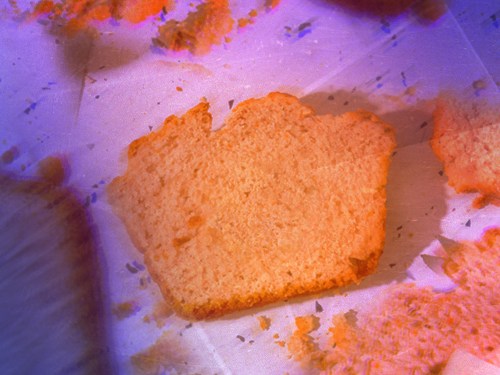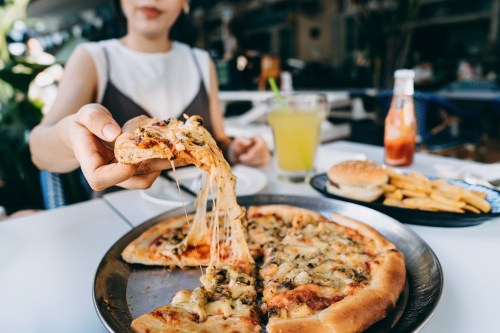Our editors independently select these products. Making a purchase through our links may earn Well+Good a commission

Eugenicists Shaped the Pathologized Way Many Americans Think About Nutrition Today
Mixing food with morality has always been—and continues to be—a recipe for disaster.
Experts in This Article
anti-diet dietitian based in Philadelphia, Pennsylvania
Danielle Dreilinger is an American South storytelling reporter for Gannett/USA Today Network and the author of The Secret History of Home Economics.
Helen Zoe Veit is an associate professor of history at Michigan State University and the author of Modern Food, Moral Food: Self-Control, Science, and the Rise of Modern American Eating in the Early Twentieth Century.
Kate Gardner Burt, PhD, RD is an assistant professor at Lehman College and a registered dietitian and culinary nutritionist.
Shaun Chavis is a food journalist and former cookbook editor.
If you were to flip through the March 1911 issue of Good Health magazine, you would have found a regular recipe column by Lenna Frances Cooper, one of the first American registered dietitians. In her contribution to this issue, entitled "The Dinner Pail," Cooper offers practical advice for packing lunch for others, along with a few vegetarian recipes for filling said dinner pail. There is an egg and olive sandwich, stuffed figs, potato and celery salad, and more, all looking "nourishing and digestible as well as palatable and attractive," as she says the contents of a dinner pail should be.
Flip a few pages and you'd come across a column titled "Euthenics and Eugenics.” This recurring section of the magazine—published by John Harvey Kellogg, MD, medical director and superintendent of Seventh-day Adventist health institution, the Battle Creek Sanitarium—was devoted to promoting pillars of eugenics. As defined by the National Human Genome Research Institute, eugenics refers to the “scientifically inaccurate theory that humans can be improved through selective breeding of populations…linked to historical and present-day forms of discrimination, racism, ableism and colonialism.”
Good Health’s feature story in this issue looks into whether hereditary factors or environmental factors are to blame for societal problems like disease, crime, and poverty. It ultimately concludes that "the real betterment of the human race is in better matings."
For the modern reader, these two topic focuses that occur throughout the magazine present a jarring juxtaposition: Peach shortcake and "The Need of Reform in Teaching Primitive Races” sharing a table of contents? But for a number of folks living in the Progressive Era, roughly the 1890s to the 1920s, eugenics was an accepted, influential, and ingrained belief—one that indeed touched overarching life philosophies and weekly menus alike.

In addition to breakfast cereal (which he’s credited with inventing alongside his brother, William), Dr. Kellogg was an ardent believer in eugenics. During the early 20th century, he spread the gospel through his work at the Battle Creek Sanitarium and Good Health magazine; he even hosted the 1914 National Conference on Race Betterment. One of the founders of home economics, Annie Dewey, was at the conference to introduce the concept of euthenics, which framed individual control over one's environment as both a duty and a path to health and happiness—a "sister science" to eugenics that would help "carry the race toward perfection."
Progressive reformers believed that food was fuel for building strong bodies and minds. Taking pleasure in eating, meanwhile, implied wrongful intentions and was not encouraged. At this time, the U.S. was also cementing its "melting pot" status, with immigration rates skyrocketing. Yet, many American nutrition experts expressed wariness around the foreign dishes gaining popularity—along with dishes popular among Black Americans—emphasizing that the healthiest diet was built around ingredients and cooking methods familiar to white, native-born Americans.
The science of modern nutrition was born deeply entwined with the ersatz science of eugenics, a tangle that mixed up morality with food choices, blending "eating white" with "eating right." And as much as today’s nutrition community would like to distance ourselves from the harmful teachings and practices of this time period, many of the ideas about dietary choices and health born during this time are still alive and well. Dig a little deeper, and you'll understand why Cooper's peach shortcake recipe is sitting comfortably alongside calls for "race betterment."
In the Progressive Era, what was right simply equaled what was white
The Progressive Era was marked by a zeal for “positive social change.” Many of those changes targeted systems—for example, passing laws that restricted child labor—but individual self-improvement was also a fascination of the time. Research scientists and physicians (let alone consumers) were just beginning to understand what calories and vitamins were, and the popularity of these novel concepts contributed to the birth of the dietitian.
It makes sense why many early (white American) “nutrition experts” like Cooper gained a following as the eugenics movement grew, and vice versa—the themes of exclusion and restriction so naturally emulsified. From there came the concept of the "ideal diet," one which provided the necessary amount of calories and nutrients through plain, bland meals made up of recognizable ingredients, a diet that, by design, had nothing in common with the heavily seasoned, mixed stews, pastas, stir-fries, sauces, and other foods that were staples in the diets of many immigrants and Black people.
For many eugenicists, a better society meant a whiter, wealthier society, absent of people with disabilities. At its most abhorrent, they believed Black, Indigenous, and people of color (BIPOC), immigrants, people living in poverty, and those with disabilities should not reproduce; and that practices like forced sterilization were an appropriate means to achieve that goal. Some eugenicists were more interested in exploring how to optimize life (for the white, native-born people in the room, that is).
"How can we make people better? How can we improve them mentally? How can we make them grow taller? How can we make them stronger? How can we make them live longer? How can we make them happier and healthier in a day to day sense? These were questions that most people cared even more about than the sort of racist, mechanical reproduction side of long-term racial change," Helen Zoe Veit, associate professor of history at Michigan State University and author of Modern Food, Moral Food: Self-Control, Science, and the Rise of Modern American Eating in the Early Twentieth Century, says about these Progressive Era eugenicists. "So a lot of the questions about day-to-day health, happiness, fitness, growth, and development had plenty to do with food, and this was in some ways a revelation of the early twentieth century, the idea of improving health and increasing longevity through your diet."
Eating habits of the healthy, protestant, and pure
Many leading health experts (including Dr. Kellogg) during the Progressive Era saw the culinary habits and ingredients prized by any immigrant or minority group as “wrong.” Doctors and home economists at the time preached that “mixed” dishes—like pasta or stew, where various food groups get tossed and served together—were “harder to digest,” especially for white people, and that the most healthful choice was a meal of separate, simple, lightly-seasoned foods. Think: a piece of bland baked meat, boiled potatoes, and bread every night for supper—no spice, no sauce, no pleasure. (Little did they know that this advice would be so deeply entrenched in white culinary culture that a century later, there would be viral memes about unseasoned "white people food" and even a trend in China making fun of sad "white people meals.")
Sign Up for Our Daily Newsletter
Get all the latest in wellness, trends, food, fitness, beauty, and more delivered right to your inbox.
Got it, you've been added to our email list.











